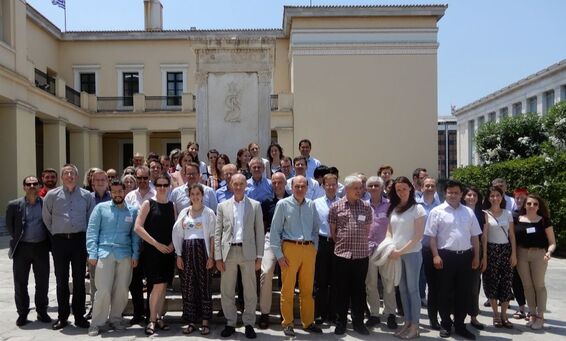Following in the footsteps of the first two very successful meetings in Cork (2017) and Frankfurt (2018) the 3rd PEARRL Annual Open Scientific Symposium took place at the National and Kapodistrian University of Athens from 12 to 13 June 2019.
The title of the symposium was “Model Informed Drug Development”. Thirty-five PEARRL consortium members, ten external speakers from Europe and twenty preregistered external attendees from Europe and the USA participated.
On the first day, the PEARRL Coordinator provided a brief overview on the consortium and its objectives before the talks under the theme of Lead optimisation through pre-clinical development started with Professor J. Dressman speaking on Pharmaceutical Profiling in the Pharmaceutical Industry by highlighting relevant challenges. The second talk was given by another PEARRLer, Professor M. Kuenz, who focused on digital approaches from drug candidate selection to computational pharmaceutics which are currently considered by Pharmaceutical Industry and the first brief presentation given by Daniel Price (ESR3) on the use of COSMOquick as a predictor of drug/excipient interactions in enhanced dosage forms completed the first session. After the coffee break Dr. Jochem Alsenz (Roche, Switzerland) delivered a very well structured talk on various high throughput biopharmaceutical screening methodologies applied in industry and the morning session closed with three brief presentations by Patrick O’Dwyer (ESR10; Small scale screening for drug specific questions), Felix Ditzinger and Georgia Tsakiridou (ESR2 and ESR4; Solid dispersions based on modelling rationale) and Niklas Koehl and Roxana Ilie (ESR1&ESR14; A guide to bioenabling formulation selection in development: focus on lipid based approaches). After lunch the first day shifted its focus to model informed pre-clinical development. The first speaker, Dr. James Butler (GSK, UK) presented an excellent talk on the role of rDCS in guiding preclinical pharm development, followed by Christian Wagner (Merck, Germany), who talked about the role of PBPK modelling in guiding preclinical pharmaceutical development. After the coffee break, Sandy Van Hemelryck (J&J, Belgium) discussed the role of animal modelling in preclinical pharm development in her talk entitled “Preclinical Bioavailability Strategy for Decisions on Clinical Drug Formulation Development”, and the first day concluded with two more brief presentation by Chara Litou (ESR6; The role of biorelevant testing in formulation development) and Christina Pentafragka (ESR7; Using luminal data for modelling absorption in the fed state).
The theme of the second day was “Clinical development through to pharmaceutical product lifecycle management”. Dr. Butler gave his second informative and interesting talk of that symposium on formulating for first in man studies, and Dr. Bertil Abrahamsson (AstaZeneca, Sweden) followed on the challenges that are typically faced when transitioning to the final formulation. After coffee short break, Dr. Neil Parrott (Roche, Switzerland) talked on the usefulness of PBPK modelling in predicting food effects on drug absorption and Dr. Masoud Jamei (Certara, UK) discussed applications of PBPK modelling in predicting complex drug-drug interactions. The morning session finished with three brief presentations by Angela Effinger (ESR15; Targeting GI diseases), Mariana Guimaraes (ESR12; In vitro evaluation of drugs/drug products for paediatrics), and Marina Statelova (ESR11; In silico evaluation of drugs/drug products for paediatrics). The afternoon session started with a PEARRL speaker, Dr. L. Kalantzi, who talked on the usefulness of modelling and simulation in the development of generics. Dr. Essam Ahmed Ghazaly Kerwash (MHRA, UK) then talked from a regulatory perspective on the use and qualification of PBPK modelling and after the coffee break, Ian Flawn Orpana (Verto Pharma AB, Sweden) talked on Statistical Process Control (SPC) in Manufacturing and Quality Control of Drug Products. The second day of the symposium concluded with three brief talks by Sandra Jankovic (ESR5; Emerging process analysers in pharmaceutics), Ioannis Loisios (ESR13; Establishing virtual bioequivalence trials simulation using population-based PBPK modelling) and Raphael Paraiso ( ESR8; The role of in vitro and in silico tools to support bioequivalence studies).
Overall, the Symposium provided the attendees with an open, up-to-date and transparent appraisal of recent advances on Model Informed Drug Development aspects which are expected to assist in shortening development timelines and reduce ethical issues relating to animal and human testing.



 RSS Feed
RSS Feed
